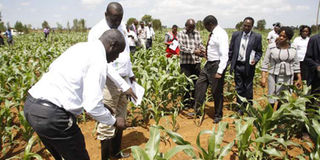Investigate maize failure in North Rift

Agriculture Principal Secretary Dr. Richard Lesiyampe second (left) talks to James Rogony, during a visit at his farm at Kabenes in Uasin Gishu County on May 24, 2016. The farmer noticed uneven germination and yellowing of his crops after using (NPK)-23:23:0 type of planting fertiliser. PHOTO | JARED NYATAYA | NATION MEDIA GROUP
What you need to know:
- Adulterated fertiliser has the risk of poisoning the soils thus adversely affecting their future use and incomes for thousands of farmers.
- Despite the evidence of yellowing of maize crop, the Agriculture Principal Secretary has continued to issue misleading and inaccurate statements.
- A syndicate of fertiliser adulteration was unearthed by the police involving National Cereals and Produce Board officers and unscrupulous dealers.
- The government impounded some of the suspect fertiliser, but to date, nothing has come out of the investigations
Maize farmers in Kenya’s grain basket of the North Rift, who used subsidised fertiliser supplied by the government during this year’s planting season, have complained of widespread crop failure.
The seed germination was uneven and the leaves of those that germinated have turned yellow and the plants stunted.
There are two dangers for farmers and the country in this developing matter. It is likely to have a serious impact on the country’s food security given that maize is our staple food and North Rift is the leading producer of the crop.
But adulterated fertiliser also has the risk of poisoning the soils thus adversely affecting their future use and incomes for thousands of farmers.
Yet the government seems to be handling this matter in a very causal manner.
It is almost two months since a syndicate of fertiliser adulteration was unearthed by the police involving National Cereals and Produce Board officers and unscrupulous dealers.
The government even impounded some of the suspect fertiliser, but to date, nothing has come out of the investigations.
Despite the evidence of yellowing of maize crop in the region, the Agriculture Principal Secretary has continued to issue misleading and inaccurate statements.
The position taken by the PS that the yellowing is as a result of excessive rains does not meet the criteria for diagnostic approaches and reporting of scientific matters. We have always had rains and this kind of yellowing has never happened before.
What is the way forward?
The government must constitute an investigation team consisting of experts from bodies like the Society of Crop Agribusiness Advisors of Kenya (SOCAA), and Kenya Agricultural and Livestock Research Organisation (KALRO), farmers representatives, parliamentary and Senate agriculture committee representatives and the Directorate of Criminal Investigations to get to the root cause of this problem.
SOURCE OF FERTILISER
We need to clearly understand the source of the fertiliser, batch numbers, manufacturers’ declaration on nutrient content at time of purchase and the nutrient content at the point of clearance.
The findings of the investigation should be made public and the government must provide a clear roadmap to ensure no repeat of this scandal.
Agro inputs adulteration is a global problem and it is unfortunate that the government is doing very little to address the challenges facing maize farmers.
For a country that relies heavily on maize for food security, it is very unfortunate that there seems to be very little being done to resolve the problem.
Preliminary estimates indicate that there is likely to be a reduction of maize yield by 25 per cent in the North Rift.
Of course, this means loss of earnings for farmers for reasons that are not of their making hence the government needs to come clear on modalities of compensating them.
This scandal will have serious consequences on the farmers’ confidence levels in government subsidised agricultural inputs.
In order to ensure that farmers continue to trust and use the subsidised fertiliser, the government must publicly address the cause, the result and the mitigations.
We, at SOCAA, are committed to working to advance discipline and professionalism in agriculture.
We are open and keen to offer professional guidance and work with the relevant institutions in the investigations and to come up with recommendations to avoid a repeat of similar incidents in the future.
Erick Ogumo is the chairman, Society of Crop Agribusiness Advisors of Kenya (SOCAA)




